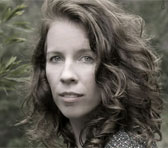29 November 2013
Genevieve Lacey's Peggy Glanville-Hicks address now online
 Image: Genevieve Lacey: 'I wonder what might happen if we started to listen to, and to think more like, our Indigenous friends. To hear music as ephemeral and essential. Music as something to be shared, not owned.'
Image: Genevieve Lacey: 'I wonder what might happen if we started to listen to, and to think more like, our Indigenous friends. To hear music as ephemeral and essential. Music as something to be shared, not owned.' Recorder virtuoso Genevieve Lacey's Peggy Glanville-Hicks Address, presented in Sydney and Melbourne on 25 and 27 November, is now available online in its entirety on the New Music Network website.
In her speech, entitled 'Learning to Listen', Lacey paid tribute to Peggy Glanville-Hicks, whose centenary was celebrated on 29 December 2012.
'She's an inspiring role model for me, a woman born a couple of generations later, still grappling with similar questions: in essence, how to mold a life around a love for music. She's left us a strong legacy - her music, her writings, and her house, to support the work of Australian composers. Hers was generous, big-hearted work... She's a great role model for being able to keep one eye on detail, one on the big picture, being able to balance her own work and needs as an artist with her strong sense for community, being single-minded about the demands of her compositional work, and able to see her role as a musician in the world as necessarily multi-faceted.'
Lacey's inspiring speech stressed the importance of working with composers and touched on the realities of being a freelance musician:
'I am a recorder player, and my instrument exists on the fringe of Western classical repertoire. I have, at best, a fleeting cameo in the grand scheme of that history. I love this position. It gives me great freedom. The reality of being a recorder player based in Australia is that there is no ready-made job for me here as a performing musician. Nothing exists unless, together with others, we create it. My work is to invent possibilities, contexts and audiences for the music, people and ideas I'm passionate about. It's a privileged way to live.'
'I work a lot with composers, which in essence means putting my recorders and myself into a series of laboratories, endlessly testing and redefining limits. Sometimes composers ask me to produce sounds I thought the recorder couldn't make. Trying to find them is like being an inventor. It's about lateral thinking, endless patience, endless listening, horrible stubbornness, and sometimes, a fleeting "Hang on, what if…?" that spins everything on its head and crashes me unsteadily through to a new place. Thanks to my marvellous composer colleagues pushing my ears, my imagination, my technique, where I land is somewhere unexplored, and suddenly, my instrument and I take on new dimensions. It's one of my favourite parts of being a musician', Lacey said.
'I took years to learn my Vivaldi. I've never had years with a brand new score before the premiere. At most, I have months; more often, weeks; alarmingly frequently, only days. So after I premiere a piece, I try to adopt it, to take it into my repertoire and my care and play it again and again. I like to live with music, to sleep on notes, to have sounds quietly simmering in the back of my head, to catch glimpses of a phrase unawares, out of the corner of my eye, in short, to listen. I love that unhurried infusion, different from the searing imprint of pressure and pace that a premiere demands. It's only after living with a piece for months or years that I begin to be able to do it justice. '
Lacey also talked about her experience leading the Four Winds festival in Bermagui, which made her aware of her own strengths and the existence of 'two types of virtuosity'
'Not just the pristine, athletic concert hall type, but the
sleeves-rolled-up virtuosity of trying to do justice to many
viewpoints, to honour different perspectives, and weave together
complexity and inconsistency, in much less privileged
spaces.'
> Read Lacey's speech on the NMN website.
© Australian Music Centre (2013) — Permission must be obtained from the AMC if you wish to reproduce this article either online or in print.
Comments
Be the first to share add your thoughts and opinions in response to this article.
You must login to post a comment.